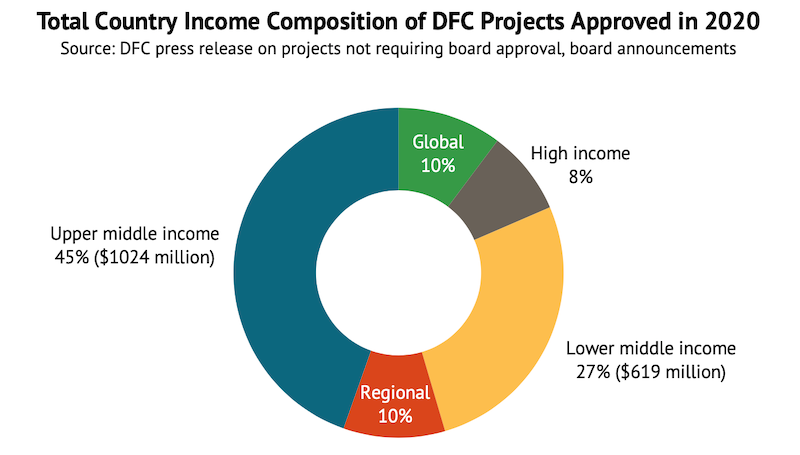At the end of June, DFC launched the first iteration of its Impact Quotient (IQ) development measurement tool, a new instrument that will rate a project’s likely results. DFC plans to use IQ at every stage of the investment process—from concept and selection, to implementation and monitoring—to assess the developmental impact of its investments.
To gain first-hand insight into the IQ tool and its role in guiding DFC toward a high-impact portfolio, CGD hosted an online event, featuring DFC CEO Adam Boehler, Congressman Joaquin Castro, DFC Vice President of Development Policy Claire Avett, and International Financial Corporation (IFC) Vice President of Economics and Private Sector Development Hans Peter Lankes. In case you missed it, you can tune in here.
Below, my colleague Jocilyn Estes and I outlined some takeaways from the discussion.
IQ is more than just a measurement tool—it’s a roadmap to impact.
CEO Boehler kicked off the discussion by emphasizing that the number of deals or dollars committed is not the yardstick for assessing DFC’s outcomes in the developing world. Instead, IQ serves as a more refined tool for assessing a project’s expected (and eventually actual) impact, while also guiding the agency towards the most developmental decision.
In her presentation, Avett described how DFC will use IQ to assess the impact of prospective projects on growth, inclusion, and innovation. Designed to be integrated throughout the lifespan of a project, the agency will also use IQ to gauge whether projects deliver on their expected development outcomes. Avett emphasized that—beyond understanding how investments perform relative to expectations—the value of the IQ tool involves engagement at every stage of the investment cycle. She highlighted a couple of unique ways in which IQ can contribute to increased development impact:
- Measuring impact from project inception elevates the importance of development in project selection. Deals can receive “bonus points,” like for having gender-diverse leadership. In this way, IQ creates clear incentives to maximize the impact of DFC projects beginning at deal origination.
- The IQ process can also help make a project become more developmental by identifying areas of weakness that investment officers can work with clients to mitigate and improve.
Country context is key.
IQ has targeted metrics that reflect the scale of what a project is likely to accomplish in a specific country. Country context is particularly critical to ensuring the agency can pursue inclusive investment. Congressman Castro highlighted the importance of a human-centered approach that places vulnerable individuals at the center of strategies to build developing economies. Lankes also echoed this point by describing the IFC’s work to establish in-country sector benchmarks for inclusion. These benchmarks provide the baseline for measuring IFC investment contributions—relative to gender gaps in a sector for example—through the Anticipated Impact Measurement and Monitoring (AIMM) tool.
IQ’s similar emphasis on inclusivity as one of three central pillars allows DFC to take a tailored approach and target financing to meet the needs of underserved populations within a country.
These tools must be adaptable, especially during a time of crisis
A key message echoed by a number of the participants: institutions, and their stakeholders, must recognize that impact measurement tools should be flexible.
Congressman Castro noted that the coronavirus pandemic has pushed developing countries into a unique state of dual crisis: public health and economic. And he emphasized that development strategies and frameworks will need to adapt to address this new state of affairs. Lankes asserted that measurement tools like the IQ must build in flexibility in order to address changing circumstances throughout the project cycle. For instance, in the COVID-19 context, providing rapid liquidity support can be a more highly developmental instrument than in times of economic growth. But this also means accepting some uncertainty and a willingness to iterate and course correct.
And there’s more to come...
In the year ahead, DFC will be able to start comparing project performance to IQ projections. This will be an interesting space to watch to understand whether the system is successfully leading to better project outcomes. We look forward to remaining engaged on this topic.
CGD blog posts reflect the views of the authors, drawing on prior research and experience in their areas of expertise.
CGD is a nonpartisan, independent organization and does not take institutional positions.







